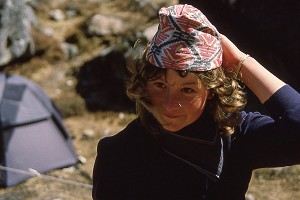
An interview with Ed Douglas about Alison Hargreaves
Ed Douglas's experience with climbers goes back a long way: he once said that his first encounter with Johnny Dawes was seeing him in the school gym and being told by a schoolmate, "That's Dawes. He's mad." Not long after, he went to Manchester University to study English where he also studied climbing and wrote the university climbing club's magazine, which was called The Edge. The magazine transmuted into On The Edge - which you may have heard of. For years he edited it, before moving on to start up Mountain Review, which had a brief and glorious existence. He now edits The Alpine Journal, and writes for Climber magazine, The Guardian and has just started another book project. He is the author of Chomolungma Sings The Blues, about the effects of Western commercialism on Everest and its surroundings. He lives in Sheffield with his wife Katie and two children.
| "We agreed that leaving the children out of the book as far as possible was important. It's not their biography, or her husband's, it's Alison's...." |
Alison Hargreaves was the first woman to climb Everest unsupported, without supplementary oxygen. To most people her story is one of triumph followed by disaster when she was killed on the descent from K2 in August 1995.
Regions Of The Heart by Ed Douglas and David Rose is the biography, first published in 1999, and now available in paperback. We talked with Ed about the book, its origins and lessons, and where he thinks climbing is going.
UKC: When did you start on the book? What was your opinion of Alison before you started on the book, as a climber and a person?
ED: From what I remember, we started working on it in the late autumn of 1995, a few months after her death. I knew Alison, although not that well, throughout the previous six or seven years. She had a mixed reputation in the climbing scene, something I could never entirely square with what I knew of her personally. I had interviewed her in the summer of 1994 and found her very composed, very intense. But she seemed quick to contrast herself with other climbers which suggested her tough exterior was masking a rather insecure climbing ego.
I saw her a couple of times later in 1994 and then met her again at Everest Base Camp in 1995. I was immediately struck at the difference in her attitude; she was much more relaxed and happy and seemed almost literally bigger. She was much funnier too, much less on her guard.
UKC: What is your opinion now? Is there anything that happened in between that changed your opinion?
ED: Obviously a great deal has changed in the last three and a half years and had I known a fraction of it when she was still alive it would have given me a very different perspective on some of the things I noticed about her. She wasn't somebody who discussed her problems at all readily, but I think her life would have been very different if she had.
UKC: Did you ask Jim Ballard [Alison's husband] if he would cooperate in the research for the book?
ED: Of course. He declined.
UKC: Assuming that he made it clear he wouldn't cooperate, you seem to have gone for the other route - he is almost hard to find, though he has a sort of "gorilla in the living room" presence. There are barely any quotes from him even at second hand. You also don't mention the "pilgrimage" after Alison's death by him and the children; why didn't that seem like part of the aftermath to you?
| "She came from a very middle-class background and laid emphasis on material security..." |
ED: I dispute that he is hard to find. We talk about his background, his ambitions, his position in the climbing world, the things that were attractive about him. He is clearly someone who has been prone to depression, and I am very sympathetic to that. He clearly suffered as well.
We do quote him, and I contest the word 'barely'. As for the pilgrimage, that happened after Alison's death. We agreed that leaving the children out of the book as far as possible was important. It's not their biography, or his, it's Alison's. That whole issue is a difficult area, but not strictly relevant to the story of Alison's life.
UKC: While we become increasingly confident about what Alison's motives are, we never understand quite what attracted him to her - at school age - and then what he thought of becoming the house- (or maybe tent-) husband, looking after the two kids while his wife is off doing North faces.
ED: Alison's motivation for moving in with Ballard was a matter of confusion for those who knew her all her life, so explaining it was difficult. She came from a very middle-class background and laid emphasis on material security. By moving in with Jim, she got that immediately. He was funny, abrasive and apparently larger than life, which must have made him quite attractive, and I speculate that he has a vulnerable side which women are drawn to.
I am sure she loved him, which is a good motivation for most things, and I am equally sure that later on her sense of commitment kept her there. I think these points are apparent from the book, although obviously we were feeling our way a little.
UKC: What do you think the effect of Alison's death has been for women mountaineers in Britain?
ED: I'm not sure it's had a major impact, other than being very sad, except for those women contemplating an ascent of K2. There are now plenty of women mountaineers in the UK, partly through her influence. I think her life has proved her an inspiration.
UKC: The book turned my opinions around about what was driving her on, what made her stay on K2. Do you think that it's going to be possible to people to understand the truth now, five years after her death? Anatoli Boukreev's reputation never recovered from Jon Krakaeur's book because Krakaeur's came out first. These days, doesn't it seem like people think "first" means "true"?
| "Anyone with a genuine interest in climbing will find a lot in the book to explain Alison's actions... the newspaper version of her was badly drawn..." |
ED: I think most genuine mountaineers who know anything about the sport have a pretty good idea of how Anatoly Boukreev's reputation stands. Who gives a damn what the American public thinks? There are plenty of mountaineers around now who take advantage of the public's ignorance...
UKC: In what way?
ED: You only have to look at Everest for an illustration of that. It's difficult to think of parallels. Perhaps it's similar to the way there are populist scientists like Steven Pinker, Steve Jones and Stephen Jay Gould, who breed resentment among equally good academics who don't have their communication skills.
There is a gap between public understanding and an approximation of the truth. David Hempleman-Adams is a good example. What exactly is his contribution to "adventure" - whatever that means? Yet the BBC hail him as our greatest living explorer. But so what?
UKC: Surely it will make some difference to the people who are being used or deceived?
ED: The public... Yes, they are often deceived, but that's their look out. They should be more discerning. Although they have a right to question their mediators - us - in the great information hunt.
The truth is that above 8,000 metres 'the truth' becomes an even more nebulous concept than it is at sea-level. As for our book, we do not claim to have written the definitive account of Alison's life, but we have tried to get as close to it as we could, given certain limitations.
The book will last a long time, unlike much of the press coverage which left impressions rather than concrete and well-thought out conclusions. Anyone with a genuine interest in climbing will find a lot in the book to explain Alison's actions, and those simply interested in her will learn that the sketch of her character in the papers was badly drawn.
UKC: Given that there were two of you writing this book, how did you share out the research and writing? I got the impression that David did much of the early years and you took over more on the Himalayan side - correct?
ED: Sort of. I drafted the last three chapters, on the Alps, Everest and K2 and the one on Kangtega; he dealt with the rest. But we each added passages to the other's drafts and generally revised. I think there is a pretty homogenous style to the book. It was a very harmonious partnership.
UKC: Alison said in one of her interviews - perhaps the last - that she was pissed off at commercialism in climbing, at how people were faking things. Looking more broadly at the scene, how do you think things have changed in the past five years? Where do you think climbing is going? Which seems the healthiest offshoot, in terms of potential, ethics, and .. well, those things that attracted you to climbing? And which seems doomed to disappear?
ED: I think Alison's remark was almost self-referential. And I don't think she would have held that opinion for long except in her more negative moods. I think those trends she was complaining about have worsened, especially in Himlayan climbing.
| "Sport climbing grades have plateaued... bouldering is a much more natural way of testing technical limits..." |
But underneath all the public hype there are some stunning achievements going on which remain largely in obscurity. That's fine with me. I didn't get into climbing because I thought you could become famous, I did it because I love mountains and the actual activity.
Trying to be a shit-hot climber has never motivated me; I just love movement on rock and that feeling of space and freedom on a mountain. If masses more people get involved, then we'll see more honeypotting, like at Stanage or other favourite venues, but I contend that Cloggy is less crowded than it was ten years ago. I've been there three times this year, and judging by the state of the vegetation and descent paths, I would say that's true.
There is now a rather bloated commercial climbing world of SPSA awards, queues for Right Unconquerable and climbing wall mentalities and underneath it there is still a hardcore of how things were when I started. I have to say that the most creative things are still coming from those roots. Sport climbing grades have plateaued out, and it's now seen as a cul-de-sac by many top climbers. Bouldering is a much more natural way of testing technical limits, something Pierre Allain understood in the 1920s.
In mountaineering, a group of well-known peak baggers get the BBC headlines, but so what? If they want to be famous, then let them.
MY kind of climbing still exists and probably always will do and I feel pretty optimistic about things. It disturbed me at one stage that the things I cared about were too difficult or non-commercial to survive, but now I realise that the commercial stuff will have to prove itself or it will die.
| "That's one of the strongest lessons of mountaineering - that the margin between success and failure is very narrow." |
Who still buys Bros records? Or Desmond Bagley novels? There are plenty of young climbers who aren't arty-farty tosspots like me who recognise the value of authentic experiences. I'm sure they'll figure it out.
UKC: It seems to be a tragic story, of a woman who is shackled by what she must do. It could have been written by (ancient) Greeks; except that the chorus at the end got it all wrong. But isn't this the problem with climbing literature - it's quite hard to write jolly tales? Nobody would have heard of Joe Simpson if he'd sprained his ankle and got down OK.
ED: I think all I'm concerned about is that people should know that mountains made Alison happy. I saw that at first hand. Her story does read like a contemporary Athenian tragedy, but if she'd got off K2, she may have found redemption, and the story would have turned out very different.
That's one of the strongest lessons of mountaineering - that the margin between success and failure is very narrow.
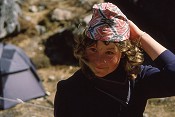
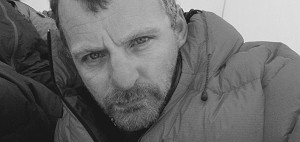

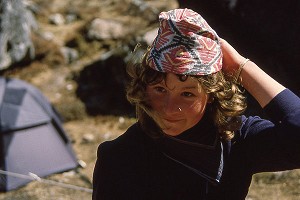
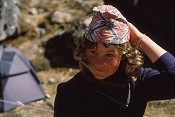








Comments